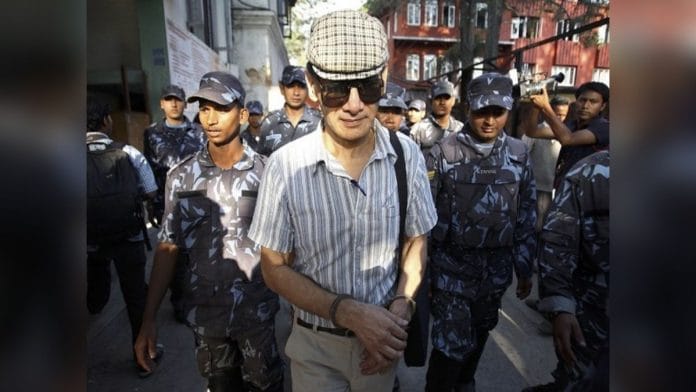New Delhi: On 1 September 2003, ‘The Serpent’ slithered into Kathmandu and wound his way to a gambling den. By chance, Joseph Nathan was also there, seeking an altogether more prosaic pleasure — a late dinner after a long day at work.
One of the world’s most notorious serial killers, suspected of having murdered more than 20 backpackers on a “hippie trail” through Asia in the 70s and the 80s, Charles ‘The Serpent’ Sobhraj was a compulsive gambler and had come to the casino after checking into a hotel downtown.
Although Sobhraj — a French citizen whose full name was Hatchand Bhaonani Gurumukh Charles Sobhraj — had exchanged his trademark beret for a baseball cap and was in casual attire, Nathan, a journalist, had no trouble recognising him.
What followed was a 14-day-long investigation that culminated in the arrest of ‘the bikini killer’, as Sobhraj was referred to in Thailand for the suspected murders of six women — all in their bikinis — in Pattaya.
As it turned out, Sobhraj, who was also in Delhi’s Tihar jail from 1976 to 1996, was a wanted man in Nepal too. The country’s police had been waiting 20 years to question him in connection with two murders — a Canadian, Laddie DuParr, and an American woman, Annabella Tremont.
On the last day of his investigation, Nathan spoke to Sobhraj.
“That night he stood up to go to the washroom and I followed him. I asked him if he was Charles Shobhraj. He looked at me, and, in his French accent, said — ‘Who is that? A Bollywood actor?” Nathan said, laughing.
On Friday — two days after Nepal’s Supreme Court ordered his release — Sobhraj will walk free after spending 19 years in a Kathmandu jail. His release from jail came on the back of a petition from his legal team asking for a concession because of his age and good behaviour.
Even though Sobhraj was arrested after The Himalayan Times published the report, the 2021 British crime drama series The Serpent, based on Sobhraj’s life and his eventual arrest, doesn’t mention this fact.
In Nepal, Sobhraj has been serving two life sentences of 20 years each for the two murders.
Although life sentences in Nepal can run up to 25 years, the country allows inmates who have shown ‘good character’ and have completed 75 per cent of their jail term to be released.
Also Read: Murder, he copied — how American crime show ‘Dexter’ influenced a brutal killing in Delhi
Gathering evidence
Once he spotted Sobhraj, Nathan asked some friends at the casino to cater to all the killer’s needs so he would spend more time there.
In order to find out where Sobhraj was staying, he also asked the casino staff to arrange for a cab to take him back to his hotel.
Nathan’s team began tailing Sobhraj and met many of the people assisting him with logistics — including the local guide he’d hired.
“We spoke to people from the hotel, his cab drivers, and the local person taking him around. We were told that he was in Kathmandu to set up a mineral water plant,” Nathan said.
The arrest
For 14 days, Sobhraj and Nathan frequented the same casino.
“I went there each night to watch him play. The casino staff told us that he played Baccarat but placed small bets,” Nathan told ThePrint.
Just a day before the story was published, he went up to Sobhraj. “He was reserved (and) didn’t talk much,” Nathan said. But by then, the journalist had everything he needed.
“I left the place to write my scoop and the next day, after the story was published, he was arrested from the same casino.”
(Edited by Uttara Ramaswamy)
Also Read: The psychopath next door: Kerala occult murders has India transfixed but there’s lot to decode






